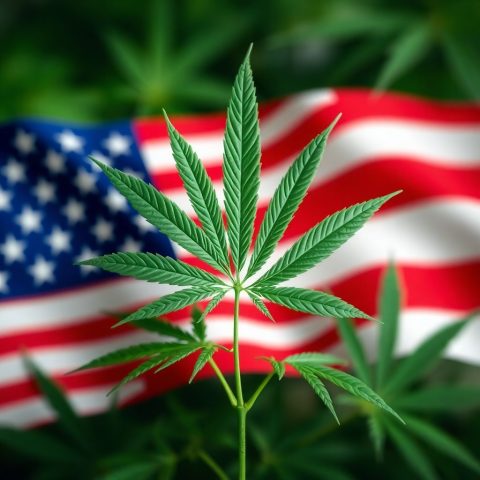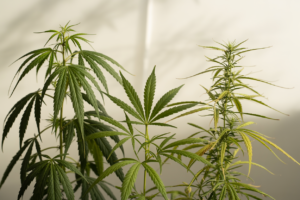- Prohibition has caused more harm than good
Federal Rescheduling and Legalization in the US

Contents
Contents
The landscape of cannabis in America is at a pivotal turning point. After decades of federal prohibition, we’re witnessing unprecedented momentum toward reform—from the DEA’s consideration of rescheduling cannabis to influential voices like former President Trump and cultural icons like Mike Tyson publicly supporting legalization. But what does all this mean for you, whether you’re a medical patient, wellness enthusiast, or simply curious about cannabis?
Let’s break down the federal rescheduling debate, what legalization could look like, and how these changes might impact medical access and wellness options across the country.
What Is Federal Rescheduling?
Currently, cannabis is classified as a Schedule I substance under the Controlled Substances Act—the most restrictive category, reserved for drugs deemed to have “no currently accepted medical use” and a “high potential for abuse.” This puts cannabis in the same category as heroin and LSD, despite overwhelming evidence of its medical benefits and widespread state-level legalization.
Federal rescheduling means moving cannabis to a different schedule—most likely Schedule III, alongside medications like ketamine and certain anabolic steroids. This change would acknowledge cannabis’s medical value while still maintaining some federal oversight.
Why Does Rescheduling Matter?
Rescheduling cannabis would have immediate, tangible impacts:
Medical Research: Currently, researching cannabis is incredibly difficult due to its Schedule I status. Rescheduling would open the floodgates for clinical studies, helping us better understand dosing, efficacy, and potential applications.
Banking and Business: Cannabis businesses currently can’t access traditional banking services, forcing many to operate cash-only. Schedule III status would ease these restrictions, making the industry safer and more transparent.
Tax Relief: Under current law (280E), cannabis businesses can’t deduct normal business expenses. Rescheduling would eliminate this punitive tax treatment.
Medical Access: More doctors would feel comfortable recommending cannabis, and insurance companies might begin covering cannabis-based treatments.
The Political Landscape: Trump, Tyson, and Momentum for Change
The political dynamics around cannabis have shifted dramatically. Former President Trump has expressed support for rescheduling and state-level legalization, marking a significant departure from traditional conservative opposition. When a Republican president backs reform, it signals that cannabis legalization is no longer a partisan issue—it’s a public health and economic one.
Meanwhile, cultural ambassadors like Mike Tyson have been vocal advocates for cannabis wellness. Tyson, who owns a cannabis ranch and has been open about how cannabis helped him with pain management and mental health, represents the growing acceptance of cannabis in mainstream wellness culture.
The DEA’s Role
The Drug Enforcement Administration (DEA) is currently reviewing cannabis’s scheduling status, following recommendations from the Department of Health and Human Services. While the process is slow and bureaucratic, the fact that it’s happening at all is historic. The DEA’s decision could come in 2024 or 2025, potentially making this year a watershed moment for cannabis reform.
Impact on Medical Patients and Wellness Users
For those using cannabis for medical purposes or general wellness, these changes could be transformative. With increased research funding and fewer regulatory hurdles, we’ll see more precise dosing information, better understanding of strain-specific effects, development of targeted formulations for specific conditions, and improved delivery methods.
Once cannabis is federally legal or rescheduled, insurance companies could begin covering cannabis treatments, making medical cannabis more affordable and accessible. Many physicians are currently hesitant to recommend cannabis due to federal prohibition. Rescheduling or legalization would allow doctors to freely discuss cannabis as a treatment option, leading to better patient outcomes.
The Wellness Revolution: Cannabis as Medicine
The conversation around cannabis has evolved from “getting high” to “getting well.” More people are discovering cannabis’s potential for pain management, sleep support, anxiety and stress relief, inflammation and recovery, and seizure control. CBD has proven so effective for certain types of epilepsy that the FDA approved Epidiolex, a CBD-based medication.
What You Can Do Now
While we wait for federal reform, here’s how you can make the most of current cannabis access:
- Know Your State Laws: Cannabis laws vary dramatically by state. Make sure you understand what’s legal where you live.
- Choose Quality Products: Look for lab-tested products from licensed, regulated dispensaries.
- Start Low, Go Slow: If you’re new to cannabis, begin with low doses (2.5-5mg for edibles) and wait at least 2 hours before taking more.
- Stay Informed: Follow reputable sources for updates on federal rescheduling progress and new research findings.
The Road Ahead
While exact timelines are uncertain, the trajectory is clear: cannabis prohibition is ending. Whether through rescheduling, incremental reform, or full legalization, federal cannabis policy is changing in response to public demand, medical evidence, and economic reality.
For wellness-focused individuals, medical patients, and anyone interested in cannabis’s therapeutic potential, these are exciting times. The barriers that have prevented research, limited access, and stigmatized users are gradually falling away.
Responsible Use and Wellness Integration
As access expands, responsible use becomes even more important. Consult healthcare providers, respect workplace policies, don’t drive impaired, store products safely, and be patient-focused when using cannabis for medical purposes.
Looking Forward
Federal rescheduling and legalization represent more than policy changes—they’re a recognition that cannabis has legitimate medical value and that prohibition has caused more harm than good. As we move toward a post-prohibition world, education, quality standards, and responsible use will be key to maximizing cannabis’s benefits while minimizing potential risks.
Whether you’re a long-time cannabis user, a medical patient exploring new treatment options, or simply curious about cannabis wellness, stay informed, advocate for sensible policy, and make choices that support your health and wellbeing. The cannabis landscape is changing rapidly, and these changes could soon make safe, legal, high-quality cannabis products available to anyone who could benefit—marking a true wellness revolution.
Disclaimer: This article is for educational purposes only and does not constitute medical advice. Cannabis remains federally illegal in the United States. Consult with healthcare professionals before using cannabis, especially if you have health conditions or take other medications. Only use cannabis in accordance with your state and local laws.




